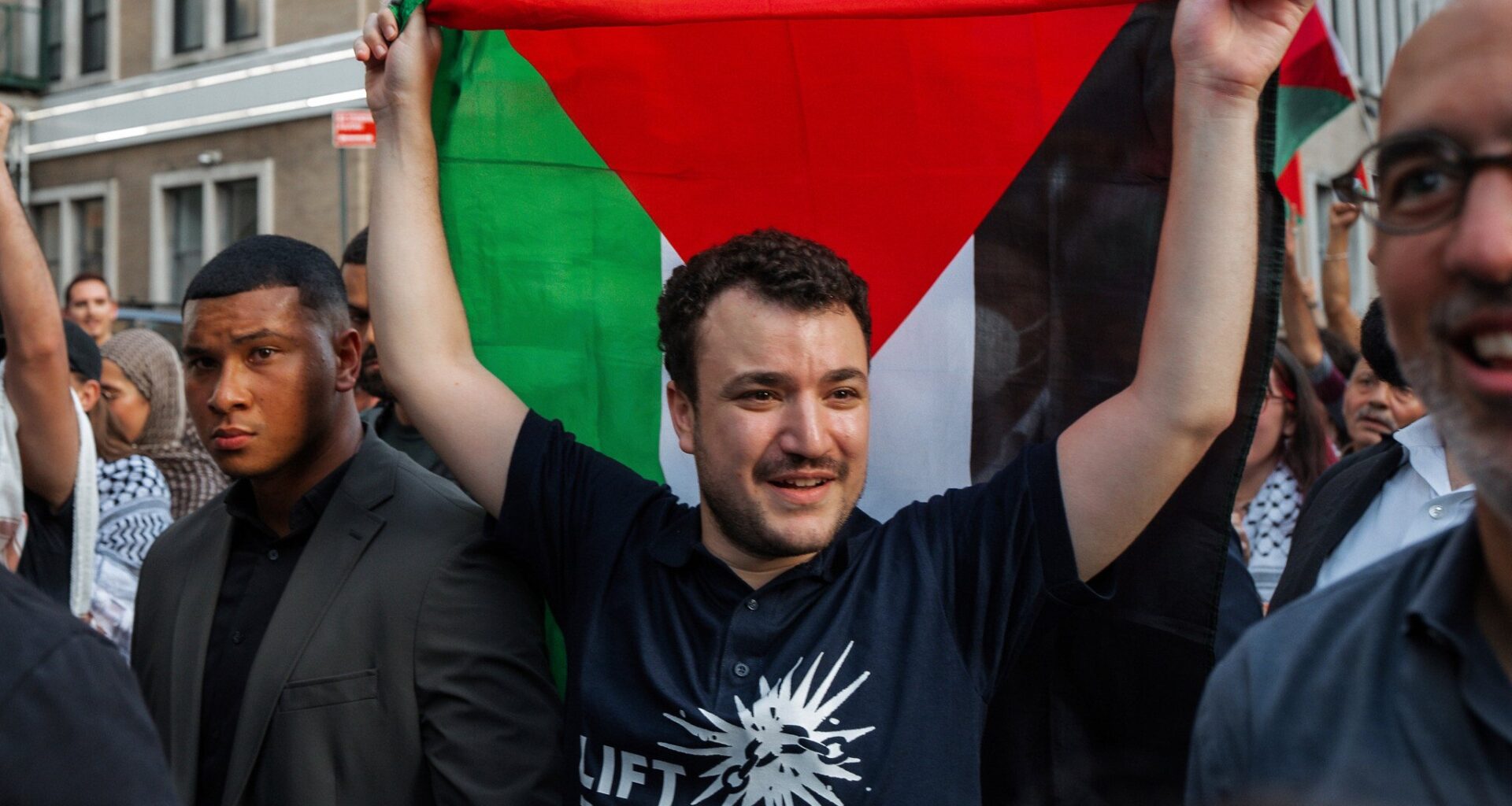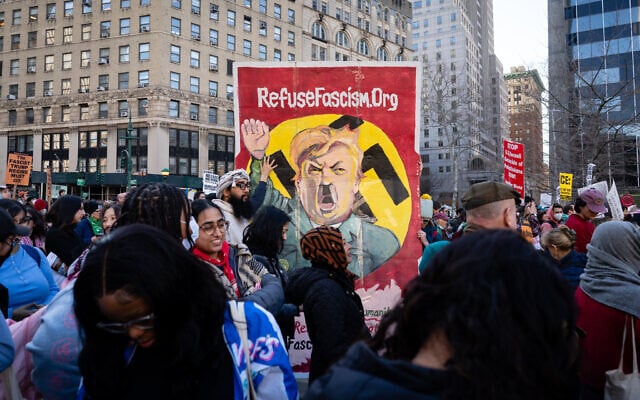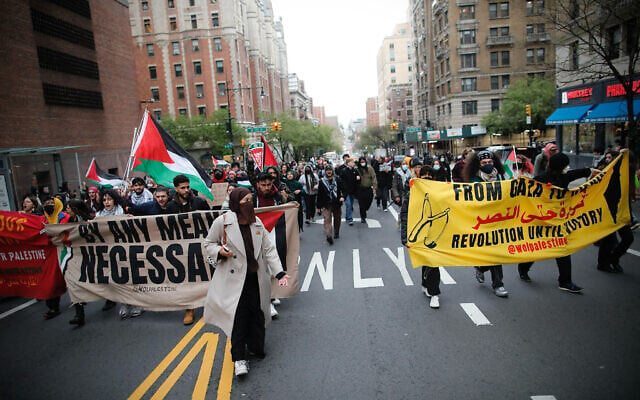Six weeks after being released from US federal detention, Mahmoud Khalil, the first pro-Palestinian protest leader to be arrested by President Donald Trump’s administration last spring, has defended Hamas’s onslaught of October 7, 2023, and said concerns about antisemitism at Columbia University reflect a “manufactured hysteria.”
Khalil first made the latter allegation in a jailhouse letter in April, soon after he was detained by immigration authorities over his role in the university’s pro-Palestinian protests, which critics said were fueling antisemitism.
He repeated it in a wide-ranging interview with New York Times columnist Ezra Klein published on Tuesday. The interview appeared to mark the most extensive public questioning that Khalil has faced about the allegations of antisemitic activity that made him a symbol of the Trump administration’s crackdown on colleges.
In the interview, Klein delved into Khalil’s arrest on March 10, which stemmed from allegations that he had fueled antisemitism on Columbia University’s campus, and subsequent three-month detainment at an Immigration and Customs Enforcement (ICE) detention center in Louisiana. In June, in Khalil’s first interview since he was released from federal detention, he told the New York Times that his detainment “felt like kidnapping.”
During the interview, Klein repeatedly invoked his Jewish identity, but when he brought up his personal experience with antisemitism and allegations of antisemitism at Columbia University, Khalil pushed back.
Get The Times of Israel’s Daily Edition
by email and never miss our top stories
By signing up, you agree to the terms
“Look, I’m Jewish. I don’t take antisemitism lightly. You should see my inbox. And it can be true that Jews can be unsafe, but the idea — it is real that there was antisemitism at Columbia, yet nobody there ended up as unsafe as you did,” said Klein.
“I would push back regarding antisemitism at Columbia. I would really push back on that,” replied Khalil, to which Klein responded: “There was none?”
Protesters demand the release of Columbia protest organizer Mahmoud Khalil at a rally in New York City, March 10, 2025. (Luke Tress/Times of Israel)
“I wouldn’t say there was none. I would say there is this manufactured hysteria about antisemitism at Columbia because of the protests,” Khalil replied.
He added: “Proud Boys were at the doors of Columbia, the very right-wing group. And there are incidents here and there. But it’s not like antisemitism is happening at Columbia because of the Palestine movement.”
There does not appear to be any evidence that members of the Proud Boys were at Columbia. A Columbia antisemitism task force reported last year that Jews experienced “crushing” discrimination on campus, much of it related to the pro-Palestinian protest movement.
Khalil’s arrest in March by immigration authorities marked a flashpoint in the Trump administration’s campaign against antisemitism on college campuses. In its wake, several other non-citizen pro-Palestinian student protesters faced arrests and deportation efforts, prompting outcry and calls for due process, including from many Jewish groups.
Last month, Columbia, where Khalil earned a graduate degree, reached a $221 million dollar settlement with the federal government over antisemitism allegations. In June, the school released a report that found that nearly two-thirds of its Jewish students reported not feeling accepted for their religious identity during the school year that included Hamas’s October 7, 2023, onslaught in Israel.
Pro-Palestinian, anti-Israel protesters march outside Columbia University in New York City on April 18, 2024. (Kena Betancur / AFP)
“This is why I would always push back,” continued Khalil in his response to Klein’s invocation of antisemitism at Columbia. “I have a strong belief that antisemitism and anti-Palestinian racism rise together. The incidents rise together because the same groups are perpetrating that in different ways.”
Khalil also defended the phrases “Globalize the intifada” and “From the river to the sea, Palestine will be free,” which pro-Palestinian activists claim are nonviolent but many Jews and Israelis interpret as calls to expanding Palestinian campaigns of terror attacks on civilians and for the ethnic cleansing of Jews from the Holy Land.
He also said that Hamas’s October 7 atrocities violated international law because they targeted civilians, but characterized it as inevitable. Shortly before Khalil’s arrest, he led a protest where activists distributed Hamas propaganda on campus.
Some 1,200 people, most of them civilians, were slaughtered in the Hamas-led invasion of southern Israel amid acts of brutality including sexual assault, torture, dismemberment and mutilation that overtly targeted civilians in their homes and at a music festival; 251 were abducted to the Gaza Strip, where 49, not all of them alive, are still being held hostage alongside of the body of a soldier killed in 2014.
Early in the interview, Klein asked Khalil whether he thought Hamas attacked Israel to provoke “some kind of war,” or whether he saw it “as something that needed to happen to break the equilibrium” in a conflict that had stagnated.
“It’s more the latter — just to break the cycle, to break that Palestinians are not being heard,” said Khalil. “And to me, it’s a desperate attempt to tell the world that Palestinians are here, that Palestinians are part of the equation. That was my interpretation of why Hamas did the October 7 attacks on Israel.”
While noting that he’s against the targeting of civilians, Khalil repeated several times that “we cannot ask Palestinians to be perfect victims.”
He also implied that the onslaught stemmed in part from the movement toward an Israel-Saudi Arabia normalization deal.
“At that point, there was no political process,” he claims. “It was clear that the Saudi-Israel deal is very imminent, and Palestinians wouldn’t have any path to statehood and self-determination. So they had to do that, according to their calculations — which, it’s obvious, were not right.”
You appreciate our journalism

You clearly find our careful reporting valuable, in a time when facts are often distorted and news coverage often lacks context.
Your support is essential to continue our work. We want to continue delivering the professional journalism you value, even as the demands on our newsroom have grown dramatically since October 7.
So today, please consider joining our reader support group, The Times of Israel Community. For as little as $6 a month you’ll become our partners while enjoying The Times of Israel AD-FREE, as well as accessing exclusive content available only to Times of Israel Community members.
Thank you,
David Horovitz, Founding Editor of The Times of Israel
Already a member? Sign in to stop seeing this


